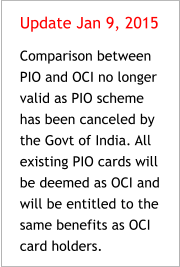Dual Citizenship India? - OCI
Compare OCI Card to PIO Card*
The constitution of India does not allow Indian citizenship and citizenship of a foreign country at the same time. India does not offer dual citizenship. Many nonresident Indians were left with the impression during the last two years that the government of India had decided to grant dual citizenship. Instead of Dual citizenship, India offers a lifelong visa and has cleverly called it Overseas Citizen of India (OCI). Many Indians are confusing this with dual citizenship. Those applicants who are granted OCI receive a lifelong multiple entry visa stamp on their foreign passports and a registration booklet that looks like a passport but cannot be used as a travel document. Holders of OCI must travel using their foreign passports.Benefits allowed to OCI:
• Multi-purpose, multiple entries, lifelong visa for visiting India. • Exemption from registration with local police authority for any length of stay in India. • Parity with NRIs in respect of economic, financial and education fields, except in matters relating to the acquisition of agricultural/plantation properties. • Parity with non-resident Indians on inter-country adoption • Parity with resident Indian nationals in domestic airfares • Parity with Indian nationals in entry fees for national parks and wildlife sanctuaries. • Pursuing professions in India in pursuance of the provisions contained in the relevant act. Professions such as: Doctors, Dentists, Nurses, Pharmacists, Advocates, Architects, Chartered AccountantsThose who get OCI should realize that:
1. They do not get an Indian passport. The passport type of document issued to OCI recipients is NOT a valid passport and cannot be used for travel. 2. Have no right to vote in India. 3. Cannot run for political office. 4. Cannot be appointed as a high court/supreme court judge.Purchase of Agricultural land in India:
Another myth is that OCI holders can buy agricultural land. OCI holders simply by getting OCI are not entitled to purchase agricultural land in India. OCI holders, permanently living in India also come under the same rules as other residents. Many people are not aware that in some Indian States, even Indian citizens cannot buy agricultural land unless they qualify themselves as farmers or go through several other formalities. Many Indians do end up buying agricultural lands by getting the land use changed. This is quite common for agricultural lands that are on main roads or near roads. As construction spreads to the outer areas of cities, the price of agricultural land bordering roads is shooting up, especially if the land use can be successfully changed from agricultural to commercial. The main benefit of OCI is a lifelong visa. Holders of OCI also are exempt from registering with the police regardless of the duration of stay in India.VOTING RIGHTS FOR NRIS ?
Some news reports indicate that the government of India is presently considering allowing Non Resident Indians to vote. This has led many residents of Indian descent, who are presently settled abroad to think that one day they may be allowed to vote in India. Some former Indian citizens who are presently settled abroad and have acquired citizenships of the countries they are living in, have a misconception that they are still non-resident Indians. Some of these people still believe that they would still be classified as non resident Indians and perhaps allowed to vote if NRI’s getting voting rights in the future. Those Indians who have taken foreign citizenship will not be eligible to vote as they would be considered as foreign citizens. Update: NRIs residing abroad can now vote in Indian elections. They can register as voters at the nearest Indian consulate. Contact the Indian consulate serving your area of residence for more information.Comparing OCI with PIO card.
Persons of Indian origin who have acquired foreign citizenship are eligible to apply for a PIO Card or an OCI card. The PIO card scheme was launched earlier than the OCI card scheme and those who already hold PIO cards, can opt to apply for OCI at a reduced fee. There are some minor differences in the eligibility, procedure, cost and the benefits/restrictions between OCI and PIO card. Listed here are some of the differences between PIO and OCI so as to make it easier to compare PIO and OCI status.* Source: http://mha.nic.in/pdfs/oci-chart.pdf

Disclaimer: Information provided is for general knowledge only and should not be deemed to be professional advice. For professional advice kindly consult a professional
accountant, immigration advisor or the Indian consulate. Rules and regulations do change from time to time. Please note that in case of any variation between what has been
stated on this website and the relevant Act, Rules, Regulations, Policy Statements etc. the latter shall prevail.
© Copyright 2006 Nriinformation.com
OCI Card
PIO Card
Eligibility
Eligibility basis
Any person who at any time held an
Indian Passport; or he or either of his
parents or grand parents was born in or
was permanently resident in India as
defined in Government of India Act,
1935 and other territories that became
part of India thereafter provided neither
was at any time a citizen of Afghanistan,
Bhutan, China, Nepal, Pakistan and Sri
Lanka; or who is a spouse of a citizen of
India or a person of Indian origin as
mentioned above.
A foreign national, who was eligible to become
citizen of India on 26.01.1950 or was a citizen
of India on or at anytime after 26.01.1950 or
belonged to a territory that became part of India
after 15.08.1947 and his/her children and grand
children, provided his/her country of citizenship
allows dual citizenship in some form or other
under the local laws.
Minor children of such person are also eligible
for OCI. However, if the applicant had ever
been a citizen of Pakistan or Bangladesh, he/she
will not be eligible for OCI.
Application Process
Procedure
Eligible persons need to apply in the
prescribed form along with enclosures.
Form available on MHA’s website:
www.mha.nic.in
Applicant must download forms and send
the documents to the Indian Mission/Post
in the country where the applicant is
ordinarily resident;
Eligible persons abroad can apply on line
by downloading the OCI application form
from MHA’s website: www.mha.nic.in.
Applicant is in India, can apply to the
FRRO at Delhi, Mumbai, Kolkota,
Amritsar, CHIO, Chennai or to the Under
Secretary, OCI Cell, Citizenship Section,
Foreigners Division, Ministry of Home
Affairs, NDCC-II Building, Jai Singh
Road, New Delhi- 110001.
Application fees
Rs. 15,000/- or equivalent in local
currency for adults. For the children up
to the age of 18 years, the fee is Rs.
7500/- or equivalent in local currency.
($365 for adult, $185 for child below 18
years of age)
(i)Shall not require a separate visa to
visit India.
(ii) Will be exempt from the
requirements of registration if his/her
stay on any single visit in India does not
exceed 180 days.
(iii) In the event of continuous stay in
India exceeding 180 days, he/she shall
have to get himself/herself registered
within 30 days of the expiry of 180 days
with the concerned FRRO/FRO. (iv)
Parity with NRIs in respect of all
facilities available to the later in the
economic, financial and educational
fields except in matters relating to the
acquisition of agricultural/ plantation
properties. No parity shall be allowed
in the sphere of political rights.
$275 for US citizens ($295 for non-US
citizens) for adult. $25 for PIO card
holder if US citizen. ($45 for non-US
citizen PIO card holder)
(i) A multiple entry multi-purpose life
long visa for visiting India.
(ii)Exemption from registration with
local police authority for any length of
stay in India.
(iii) Parity with Non resident Indians
(NRIs) in respect of economic, financial
and educational fields except in relation
to acquisition of agricultural or plantation
properties.
No parity is allowed in the sphere of
political rights.
Any other benefits to OCIs will be
notified by the Ministry of Overseas
Indian Affairs (MOIA) under Section
7B(1) of the Citizenship Act, 1955.
PIO | OCI Benefits/Restrictions
Lifelong
Validity
NOW Lifelong
Not required, regardless of how long you stay
in India.
Reporting to police authorities
Now NOT required

Update Jan 9, 2015
Comparison between
PIO and OCI no longer
valid as PIO scheme has
been canceled by the
Govt of India. All
existing PIO cards will
be deemed as OCI and
will be entitled to the
same benefits as OCI
card holders.

NRI - OCI - PIO Guide & Information



Disclaimer: Information provided is for general knowledge only
and should not be deemed to be professional advice. For
professional advice kindly consult a professional accountant,
immigration advisor or the Indian consulate. Rules and
regulations do change from time to time. Please note that in
case of any variation between what has been stated on this
website and the relevant Act, Rules, Regulations, Policy
Statements etc. the latter shall prevail.
© Copyright 2006 Nriinformation.com
Dual Citizenship India?
Compare OCI Card to PIO Card*
The constitution of India does not allow Indian citizenship and citizenship of a foreign country at the same time. India does not offer dual citizenship. Many nonresident Indians were left with the impression during the last two years that the government of India had decided to grant dual citizenship. Instead of Dual citizenship, India offers a lifelong visa and has cleverly called it Overseas Citizen of India (OCI). Many Indians are confusing this with dual citizenship. Those applicants who are granted OCI receive a lifelong multiple entry visa stamp on their foreign passports and a registration booklet that looks like a passport but cannot be used as a travel document. Holders of OCI must travel using their foreign passports.Benefits allowed to OCI:
• Multi-purpose, multiple entries, lifelong visa for visiting India. • Exemption from registration with local police authority for any length of stay in India. • Parity with NRIs in respect of economic, financial and education fields, except in matters relating to the acquisition of agricultural/plantation properties. • Parity with non-resident Indians on inter- country adoption • Parity with resident Indian nationals in domestic airfares • Parity with Indian nationals in entry fees for national parks and wildlife sanctuaries. • Pursuing professions in India in pursuance of the provisions contained in the relevant act. Professions such as: Doctors, Dentists, Nurses, Pharmacists, Advocates, Architects, Chartered AccountantsThose who get OCI should realize that:
1. They do not get an Indian passport. The passport type of document issued to OCI recipients is NOT a valid passport and cannot be used for travel. 2. Have no right to vote in India. 3. Cannot run for political office. 4. Cannot be appointed as a high court/supreme court judge.Purchase of Agricultural land in India
Another myth is that OCI holders can buy agricultural land. OCI holders simply by getting OCI are not entitled to purchase agricultural land in India. OCI holders, permanently living in India also come under the same rules as other residents. Many people are not aware that in some Indian States, even Indian citizens cannot buy agricultural land unless they qualify themselves as farmers or go through several other formalities. Many Indians do end up buying agricultural lands by getting the land use changed. This is quite common for agricultural lands that are on main roads or near roads. As construction spreads to the outer areas of cities, the price of agricultural land bordering roads is shooting up, especially if the land use can be successfully changed from agricultural to commercial. The main benefit of OCI is a lifelong visa. Holders of OCI also are exempt from registering with the police regardless of the duration of stay in India.VOTING RIGHTS FOR NRIS ?
Some news reports indicate that the government of India is presently considering allowing Non Resident Indians to vote. This has led many residents of Indian descent, who are presently settled abroad to think that one day they may be allowed to vote in India. Some former Indian citizens who are presently settled abroad and have acquired citizenships of the countries they are living in, have a misconception that they are still non-resident Indians. Some of these people still believe that they would still be classified as non resident Indians and perhaps allowed to vote if NRI’s getting voting rights in the future. Those Indians who have taken foreign citizenship will not be eligible to vote as they would be considered as foreign citizens. Update: NRIs residing abroad can now vote in Indian elections. They can register as voters at the nearest Indian consulate. Contact the Indian consulate serving your area of residence for more information.Comparing OCI with PIO card.
Persons of Indian origin who have acquired foreign citizenship are eligible to apply for a PIO Card or an OCI card. The PIO card scheme was launched earlier than the OCI card scheme and those who already hold PIO cards, can opt to apply for OCI at a reduced fee. There are some minor differences in the eligibility, procedure, cost and the benefits/restrictions between OCI and PIO card. Listed here are some of the differences between PIO and OCI so as to make it easier to compare PIO and OCI status.* Source: http://mha.nic.in/pdfs/oci-chart.pdf
Eligibility PIO Card Any person who at any time held an Indian Passport; or he or either of his parents or grand parents was born in or was permanently resident in India as defined in Government of India Act, 1935 and other territories that became part of India thereafter provided neither was at any time a citizen of Afghanistan, Bhutan, China, Nepal, Pakistan and Sri Lanka; or who is a spouse of a citizen of India or a person of Indian origin as mentioned above. Eligibility OCI Card A foreign national, who was eligible to become citizen of India on 26.01.1950 or was a citizen of India on or at anytime after 26.01.1950 or belonged to a territory that became part of India after 15.08.1947 and his/her children and grand children, provided his/her country of citizenship allows dual citizenship in some form or other under the local laws. Minor children of such person are also eligible for OCI. However, if the applicant had ever been a citizen of Pakistan or Bangladesh, he/she will not be eligible for OCI. Application Process PIO Card Eligible persons need to apply in the prescribed form along with enclosures. Form available on MHA’s website: www.mha.nic.in Applicant must download forms and send the documents to the Indian Mission/Post in the country where the applicant is ordinarily resident; Application Process OCI Card Eligible persons abroad can apply on line by downloading the OCI application form from MHA’s website: www.mha.nic.in. Applicant is in India, can apply to the FRRO at Delhi, Mumbai, Kolkota, Amritsar, CHIO, Chennai or to the Under Secretary, OCI Cell, Citizenship Section, Foreigners Division, Ministry of Home Affairs, NDCC-II Building, Jai Singh Road, New Delhi- 110001. Application fee PIO Card Rs. 15,000/- or equivalent in local currency for adults. For the children up to the age of 18 years, the fee is Rs. 7500/- or equivalent in local currency. ($365 for adult, $185 for child below 18 years of age) Validity Lifelong - Reporting to police authorities NOT required anymore! Application fee OCI Card $275 for US citizens ($295 for non-US citizens) for adult. $25 for PIO card holder if US citizen. ($45 for non-US citizen PIO card holder) Validity Lifelong. Reporting to police authorities NOT required.
RI Information
Informing
educating and connecting Indians across the globe
N
RI Information
Informing
educating and connecting Indians across the globe


































